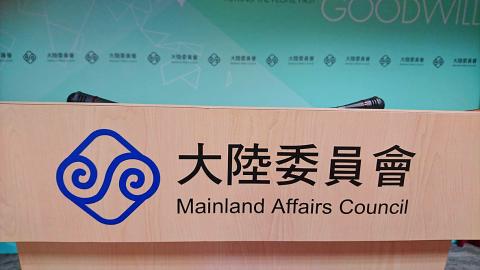Taiwan “resolutely” rejects Beijing’s “one country, two systems” formula as a solution to cross-strait relations, the Mainland Affairs Council said yesterday.
Chinese President Xi Jinping (習近平) again issued the call in his speech on China’s National Day, saying that Beijing would persist in its determination to “peacefully reunite [China and Taiwan] under ‘one country, two systems,’” and would “maintain the long-term prosperity and stability of Hong Kong and Macau.”
China would “push for the peaceful development of cross-strait relations, and continue to fight for the realization of the complete unification of the ‘motherland,’” Xi said.

Photo: Chung Li-hua, Taipei Times
The “one country, two systems” formula is not suitable for Taiwan, the council said, calling instead on Beijing to implement democratic reforms to benefit its people.
The Republic of China (ROC) has been a sovereign nation for 108 years, and on Taiwan, it is has put democracy into practice and prospered, it said.
“Chinese authorities must realize what is an international fact: Taiwan has never for a second been a part of the People’s Republic of China,” it said.
By clinging to a one-party dictatorship for 70 years, the Chinese Communist Party has violated the democratic and human rights of its people, turning itself into a threat and a challenge to the nation’s sustained development, it said.
“Talking about ‘struggle’ and the ‘great rejuvenation and unification’ [of Chinese people] ... are just excuses for military expansion that threatens regional peace and stability,” it said.
The Taiwanese government will not waver in its protection of the nation’s sovereignty and democracy, and will never give in to threats or coercion, it said.
Democratic Progressive Party spokeswoman Hsueh Cheng-yi (薛呈懿) said that Taiwanese would never forget Xi’s threat of the use of force as an option to unify China and Taiwan.
The results of China’s “one country, two systems” can already be seen in Hong Kong, where public calls for democracy have been met with violent suppression, she said.
The Chinese Nationalist Party (KMT) said that it was regrettable that Xi appeared not to have noticed changes on both sides of the Taiwan Strait over the past nine months.
“The KMT does not support the ‘one country, two systems’ framework and disapproves of the way President Tsai Ing-wen (蔡英文) has attempted to equate it with the ‘1992 consensus,’” it said in a statement.
The KMT urges all parties to face the fact that the ROC and its Constitution exist, it said.
As a middle-of-the-road party, the KMT strictly adheres to the ROC Constitution in handling cross-strait affairs, it said.
In 1992, the KMT helped establish the cross-strait consensus of “one China, with each side having its own interpretation of what that means,” it said.
If the KMT is voted back into power, it would ensure peace and promote cross-strait exchanges based on the “1992 consensus,” as well as on its opposition to “one country, two systems” and Taiwanese independence, it said.
As the Double Ten National Day nears, the party urges all citizens to celebrate the day by displaying the ROC national flag, it said.
The New Power Party said that “it would be impossible for Taiwan to ever accept the ‘one country, two systems’ framework.”
Beijing should respect Taiwan’s sovereignty and stop its unrealistic fantasy and attempts at interference, the party said.
“Taiwan will not adopt the ‘one country, two systems’ with a country that has no respect for human rights,” NPP spokesman Chen Chih-ming (陳志明) said.
Taiwan will continue to work on establishing itself by championing human rights, freedom and rule law, he said.
Additional reporting by Yang Chun-hui

ROLLER-COASTER RIDE: More than five earthquakes ranging from magnitude 4.4 to 5.5 on the Richter scale shook eastern Taiwan in rapid succession yesterday afternoon Back-to-back weather fronts are forecast to hit Taiwan this week, resulting in rain across the nation in the coming days, the Central Weather Administration said yesterday, as it also warned residents in mountainous regions to be wary of landslides and rockfalls. As the first front approached, sporadic rainfall began in central and northern parts of Taiwan yesterday, the agency said, adding that rain is forecast to intensify in those regions today, while brief showers would also affect other parts of the nation. A second weather system is forecast to arrive on Thursday, bringing additional rain to the whole nation until Sunday, it

CONDITIONAL: The PRC imposes secret requirements that the funding it provides cannot be spent in states with diplomatic relations with Taiwan, Emma Reilly said China has been bribing UN officials to obtain “special benefits” and to block funding from countries that have diplomatic ties with Taiwan, a former UN employee told the British House of Commons on Tuesday. At a House of Commons Foreign Affairs Committee hearing into “international relations within the multilateral system,” former Office of the UN High Commissioner for Human Rights (OHCHR) employee Emma Reilly said in a written statement that “Beijing paid bribes to the two successive Presidents of the [UN] General Assembly” during the two-year negotiation of the Sustainable Development Goals. Another way China exercises influence within the UN Secretariat is

CHINA REACTS: The patrol and reconnaissance plane ‘transited the Taiwan Strait in international airspace,’ the 7th Fleet said, while Taipei said it saw nothing unusual The US 7th Fleet yesterday said that a US Navy P-8A Poseidon flew through the Taiwan Strait, a day after US and Chinese defense heads held their first talks since November 2022 in an effort to reduce regional tensions. The patrol and reconnaissance plane “transited the Taiwan Strait in international airspace,” the 7th Fleet said in a news release. “By operating within the Taiwan Strait in accordance with international law, the United States upholds the navigational rights and freedoms of all nations.” In a separate statement, the Ministry of National Defense said that it monitored nearby waters and airspace as the aircraft

Taiwan’s first drag queen to compete on the internationally acclaimed RuPaul’s Drag Race, Nymphia Wind (妮妃雅), was on Friday crowned the “Next Drag Superstar.” Dressed in a sparkling banana dress, Nymphia Wind swept onto the stage for the final, and stole the show. “Taiwan this is for you,” she said right after show host RuPaul announced her as the winner. “To those who feel like they don’t belong, just remember to live fearlessly and to live their truth,” she said on stage. One of the frontrunners for the past 15 episodes, the 28-year-old breezed through to the final after weeks of showcasing her unique